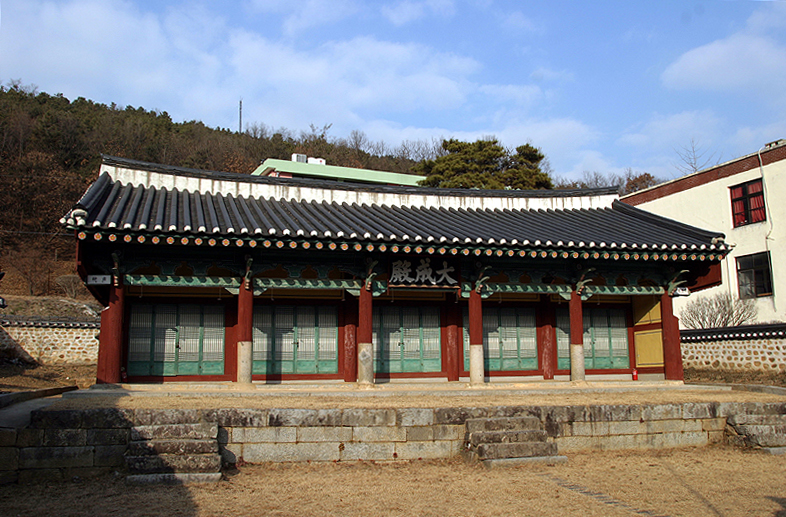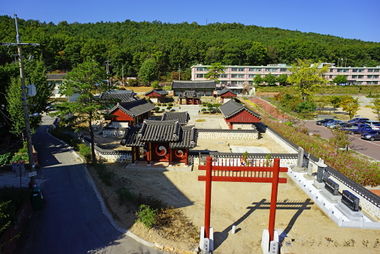"강화향교"의 두 판 사이의 차이
(→동영상) |
(→영문) |
||
| 20번째 줄: | 20번째 줄: | ||
향교는 유교 성현들에게 제사를 지내고 지방민을 교육하기 위해 세웠던 국립 지방교육기관이다. 강화향교는 고려 인종 5년(1127) 내가면 고천리에 세워졌다. 그 후 여러 차례 옮겨지고 복원되었는데, 지금 있는 위치는 영조 7년(1731) 유수 유척기(兪拓基)가 옮긴 곳이다. 남아 있는 건물로는 제사 공간인 대성전과 동무·서무, 교육 공간인 명륜당을 비롯해 여러 부속 건물이 있다. 조선 시대에는 국가로부터 토지, 노비, 책 등을 지원 받아 제사와 교육의 기능을 담당했으나, 갑오개혁 이후 교육 기능은 사라지고 제사의 기능만 남게 되었다. | 향교는 유교 성현들에게 제사를 지내고 지방민을 교육하기 위해 세웠던 국립 지방교육기관이다. 강화향교는 고려 인종 5년(1127) 내가면 고천리에 세워졌다. 그 후 여러 차례 옮겨지고 복원되었는데, 지금 있는 위치는 영조 7년(1731) 유수 유척기(兪拓基)가 옮긴 곳이다. 남아 있는 건물로는 제사 공간인 대성전과 동무·서무, 교육 공간인 명륜당을 비롯해 여러 부속 건물이 있다. 조선 시대에는 국가로부터 토지, 노비, 책 등을 지원 받아 제사와 교육의 기능을 담당했으나, 갑오개혁 이후 교육 기능은 사라지고 제사의 기능만 남게 되었다. | ||
| − | ===영문=== | + | ===영문 <ref>출처: [http://dh.aks.ac.kr/~heritage/wiki/index.php/%EA%B0%95%ED%99%94%ED%96%A5%EA%B5%90 HeritageWiki 강화향교]</ref><br/> |
| + | === | ||
A ''hyanggyo'' is a local, public education institution of the Goryeo (918-1392) and Joseon (1392-1910) periods. It is usually composed of a lecture hall called Myeongnyundang and a shrine called Daeseongjeon that enshrines the spirit tablets of Confucius and Confucian sages and scholars. Confucianism was the ruling principle of the Joseon Dynasty, and such schools were established in every corner of the country to promote Confucianism during this period. | A ''hyanggyo'' is a local, public education institution of the Goryeo (918-1392) and Joseon (1392-1910) periods. It is usually composed of a lecture hall called Myeongnyundang and a shrine called Daeseongjeon that enshrines the spirit tablets of Confucius and Confucian sages and scholars. Confucianism was the ruling principle of the Joseon Dynasty, and such schools were established in every corner of the country to promote Confucianism during this period. | ||
| − | Ganghwahyanggyo was first established in 1127 during the Goryeo period. After several relocations and reconstructions, it was rebuilt at the current location in 1731 in the late Joseon period. More recently, beginning in 2009, it underwent several renovations. The two dormitory buildings, located behind the middle gate, were newly reconstructed in 2011. | + | Ganghwahyanggyo was first established in 1127 during the Goryeo period. After several relocations and reconstructions, it was rebuilt at the current location in 1731 in the late Joseon period. More recently, beginning in 2009, it underwent several renovations. The two dormitory buildings, located behind the middle gate, were newly reconstructed in 2011. |
| − | + | ||
| − | + | ||
=='''상세'''== | =='''상세'''== | ||
2019년 4월 25일 (목) 11:37 판
목차
개관
국문
향교는 유교 성현들에게 제사를 지내고 지방민을 교육하기 위해 세웠던 국립 지방교육기관이다. 강화향교는 고려 인종 5년(1127) 내가면 고천리에 세워졌다. 그 후 여러 차례 옮겨지고 복원되었는데, 지금 있는 위치는 영조 7년(1731) 유수 유척기(兪拓基)가 옮긴 곳이다. 남아 있는 건물로는 제사 공간인 대성전과 동무·서무, 교육 공간인 명륜당을 비롯해 여러 부속 건물이 있다. 조선 시대에는 국가로부터 토지, 노비, 책 등을 지원 받아 제사와 교육의 기능을 담당했으나, 갑오개혁 이후 교육 기능은 사라지고 제사의 기능만 남게 되었다.
===영문 [1]
=
A hyanggyo is a local, public education institution of the Goryeo (918-1392) and Joseon (1392-1910) periods. It is usually composed of a lecture hall called Myeongnyundang and a shrine called Daeseongjeon that enshrines the spirit tablets of Confucius and Confucian sages and scholars. Confucianism was the ruling principle of the Joseon Dynasty, and such schools were established in every corner of the country to promote Confucianism during this period.
Ganghwahyanggyo was first established in 1127 during the Goryeo period. After several relocations and reconstructions, it was rebuilt at the current location in 1731 in the late Joseon period. More recently, beginning in 2009, it underwent several renovations. The two dormitory buildings, located behind the middle gate, were newly reconstructed in 2011.
상세
위치
대성전

문묘(文廟)의 시설 가운데 공자(孔子)의 위판(位版)을 봉안한 전각.
명륜당

향교에 부설되어 있는 강학당(講學堂).
‘명륜(明倫)’이란 인간사회의 윤리를 밝힌다는 뜻으로, 『맹자』 등문공편(滕文公篇)에 “학교를 세워 교육을 행함은 모두 인륜을 밝히는 것이다.”라 한 데서 유래한 것이다.
사진
동영상
그래프
관련 사이트
- 문화재청 국가문화유산포탈(http://www.heritage.go.kr/)
- 강화군 문화관광(https://www.ganghwa.go.kr/open_content/tour/tour/tourInfoDetail.do?tour_seq=32)
참고문헌
출처
- ↑ 출처: HeritageWiki 강화향교
- ↑ 문화재청 '강화향교' 사진
답사 후기
기여
| 역할 | 이름 | 전공 |
| 정리 | 최여명 | 한국문화학 |
| 편집 |




